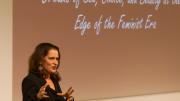Debora L. Spar grew up in the 1970s, a time when women finally had a voice and an opportunity to move up in the professional world. She thought life would be like “the Charlie commercial”—an advertisement depicting a beautiful woman, in a nice pants suit with perfectly coifed hair, carrying a brief case on her way to a fabulous job.
“We had this idea that we would just waltz into the professional world and it would just work out,” Spar told an audience in Spangler Auditorium at Harvard Business School (HBS) on Tuesday. The Barnard College president delivered the keynote address on the fiftieth anniversary of women’s admission to the Harvard M.B.A. program. “All of a sudden it kind of hit me that it was different: life wasn’t going to be like the Charlie commercial. The sheer fact of my gender was going to be an issue.”
Spar, who earned a Ph.D. in government at Harvard and eventually became Spangler Family professor of business administration and senior associate dean for faculty research and development at HBS, began her career “almost oblivious” to the fact that she was female, even though she was often called upon to “be the woman in the room”—when a woman was needed in a professional situation. Only during her time as a junior faculty member at HBS did she become intrigued by gender differences in the workplace: specifically, what it meant to be a professional woman versus a professional man.
Over the years at HBS, as Spar was repeatedly asked to solve what she calls “the woman’s problem,” she became convinced of two things: one, that there was in fact “a woman’s problem,” and two, that it was not an easy problem to fix. There were “no switches that could be flicked” or policies that could be passed that would solve it. “To some extent,” she said, “the first-wave feminists had done the easy part: they had changed the policies, they opened up HBS to women, and we are left now with a subtler set of problems that can’t be addressed by regulations and laws.”
As she left HBS for Barnard in 2008, Spar began to research what made female-run organizations different from male-run organizations and what might be done by thinking about these differences in a productive way. “ I don’t think we face problems based in prejudice,” she explained. “We have overlooked some of the basic, biological differences between men and women that play out in some very important ways that we don’t feel comfortable in discussing, and I think we need to bring that back to the table.”
As Spar heard stories from HBS and Barnard alumnae, she began to read all the feminist theory she had intentionally not read during her days in school and became convinced that much of this “woman’s problem” stems from unrealistic expectations. “These expectations have been generated from feminism, embraced by our mother’s and grandmother’s generations, blasted continuously at us by the media, and carved into our psyches nearly from birth,” she said. “These are powerful expectations and they are doomed to fail.” She showed articles from magazine’s like Real Simple and Good Housekeeping that depict the intricate cupcakes a mother should make for a child’s birthday party, or a craft project like making a bird feeder from a hollowed-out pumpkin—examples of how women really work a “second shift” after they come home from their day jobs.
Spar is currently at work on a book that explores how the aims and struggles of the first wave of feminism formed the expectations of subsequent generations of girls and women and how these dreams, hopes, and plans in turn shaped and misshaped the lived experiences of millions of American women. Each chapter examines a different phase in the trajectory of a woman’s life, looking at topics like sex, body image, marriage, babies, jobs, domestic relations, and aging.
She discussed three chapters: on jobs, domestic relations, and beauty. Although women are surpassing men in various areas—especially college acceptance rate—there comes a point after which women’s lives unfold differently. Recalling Betty Friedan’s Feminist Mystique, Spar said the author’s intention was to urge women to get out of the kitchen and throw off the duties of housekeeping. “To a large extent this has happened—we listened to part of it, we got out of the house and into the workplace,” Spar noted. “But we never stopped doing the housework.”
Feminism, she said, was supposed to be about granting women power and equality and then harnessing that power for positive change: it was a social movement. Instead, she noted, many women have turned away from feminism’s external and social goals, and have instead turned in on their own lives. “Rather than trying to address the world, we are trying to control our own very small and personal pieces of it,” she said. “Much of the choice that feminism fought for and won has ironically been magnified to the point where women today often find themselves paralyzed by the options they have. Because young women can do anything, they think that they have to do everything.”









